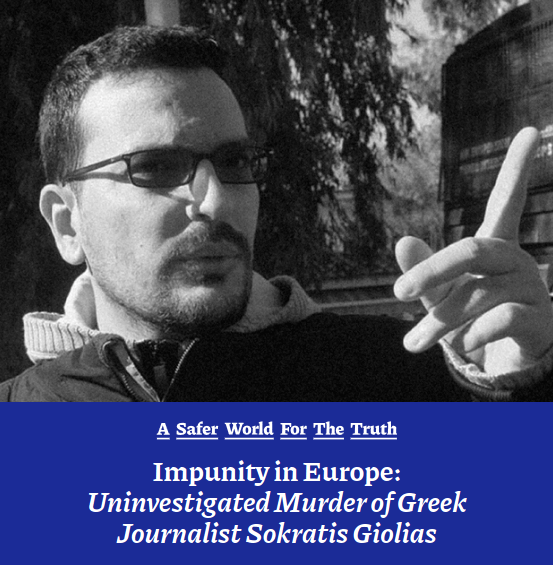Impunity in the cases of Sokratis Giolias and Giorgios Karaivaz underscores decline in media freedom in Greece
Athens, September 29, 2023—A pattern of inaction and inadequate investigation from Greek authorities in the 2010 murder of Greek journalist Sokratis Giolias was revealed in an investigation published today by press freedom groups Free Press Unlimited, the Committee to Protect Journalists and Reporters Without Borders.
“Impunity in Europe: the uninvestigated murder of Greek journalist Sokratis Giolias” found no authorities have ever been held to account for their investigative failures amid ongoing impunity in the case. The findings show strong parallels with the recent murder of Greek reporter Giorgios Karaivaz, killed on April 9, 2021.
Giolias, a former radio journalist and TV editor who started the popular news blog Troktiko, was shot and killed by two assailants in police uniforms in front of his house on July 19, 2010. The investigation is part of the A Safer World For The Truth initiative to investigate, document, and pursue justice for murdered journalists.
“Thirteen years after the murder, witnesses remain too fearful to speak out,” said Jasmijn de Zeeuw, researcher on the case at Free Press Unlimited. “The persistent impunity for two journalist murders is emblematic of the lack of priority given to the protection of Greek journalists.”
“Our investigation makes plain the failure of Greek authorities to thoroughly investigate Sokratis Giolias’ murder, underscoring the stark erosion of press freedom in Greece,” said Attila Mong, CPJ’s Europe representative. “To establish the country’s standing as a beacon of democracy, Greek authorities must swiftly implement our recommendations to bring about justice in Giolias’ case.”
“‘Assassination is the extreme form of censorship,’ as Irish writer George Bernard Shaw said. An unpunished killing of a journalist also has a self-censorship effect on his living colleagues,” said the head of the EU-Balkans desk at RSF. “Contrary to what the Greek government claims, there is censorship in Greece. And there will be until justice is served for the assassinations of Sokratis Giolias and Giorgos Karaivaz.”
Despite the militant group Sect of Revolutionaries publicly claiming responsibility for Giolias’ murder, no one has ever been charged. In 2030, the case is set to expire and authorities will no longer be able to hold anyone responsible for the murder.
Following their analysis of witness testimonies, case files, and news reports, A Safer World For The Truth’s researchers found that authorities failed to follow several leads in the investigation of Giolias’ murder, including facts that were reported in 2013.
The case files indicate that the police investigation primarily focused on verifying hypotheses launched in the Greek media. Case files seen by A Safer World For The Truth suggest that important leads, such as the relationship between Giolias and a senior police official, remain under-investigated.
The report underscores the lack of transparency from the authorities throughout the investigation, including a failure to keep Giolias’ family informed about the investigative progress.
The report demonstrates the relevance of the case to the safety of journalists in Greece, which is ranked last of all EU member states on RSF’s World Press Freedom Index.
Thirteen years after the assassination, witnesses and journalists approached for this investigation often declined to speak about the case due to fears that doing so could put them in danger. This silencing effect was also evident right after the murder when security concerns among journalists rose.
The longstanding impunity in Giolias’ case demonstrates a pattern of poor investigative standards applied to crimes against journalists in Greece, replicated in the recent case of Karaivaz, who was killed two years ago. The failure to provide justice in both these cases has created a chilling effect on the Greek press corps.
This investigation provides recommendations to independently review errors made in the investigations. It also calls on the Greek government to review its investigative practices in cases of crimes against journalists and requests the European Commission to monitor the government’s progress.
###
Notes for editors:
A Safer World For The Truth is a collaboration between Free Press Unlimited (FPU), Reporters Without Borders (RSF) and the Committee to Protect Journalists (CPJ). We investigate murders through a series of cold case investigations to push for justice on the national level, and we organize the People’s Tribunal on the Murder of Journalists to put a spotlight on states’ obligation to protect journalists and to investigate all attacks against them. To learn more about the project, visit our website https://www.saferworldforthetruth.com/.
Spokespeople are available for interviews in Dutch, French, and English:
Free Press Unlimited (Amsterdam): [email protected]
Committee to Protect Journalists (New York City): [email protected]
Reporters Sans Frontières (Paris): [email protected]
About the organizations:
Free Press Unlimited (FPU)
Free Press Unlimited is a non-profit press freedom organization based in Amsterdam, the Netherlands that helps local journalists in conflict areas to provide their audience with independent news and reliable information. By supporting local media professionals, Free Press Unlimited seeks to support the enabling of a sustainable, professional, and diverse media landscape.
Committee to Protect Journalists (CPJ)
The Committee to Protect Journalists is an independent nonprofit organization that promotes press freedom worldwide and defends the right of journalists to report the news safely and without fear of reprisal.
Reporters Without Borders (RSF)
Reporters Without Borders (RSF) is an NGO based in Paris, France. Its foreign sections, its bureaus in 10 cities, including Brussels, Dakar, Washington, Berlin, Tunis, Rio de Janeiro, Taipei and Stockholm, and its network of correspondents in 130 countries give RSF the ability to mobilize support, challenge governments and wield influence both on the ground and in the ministries and precincts where media and Internet standards and legislation are drafted.
